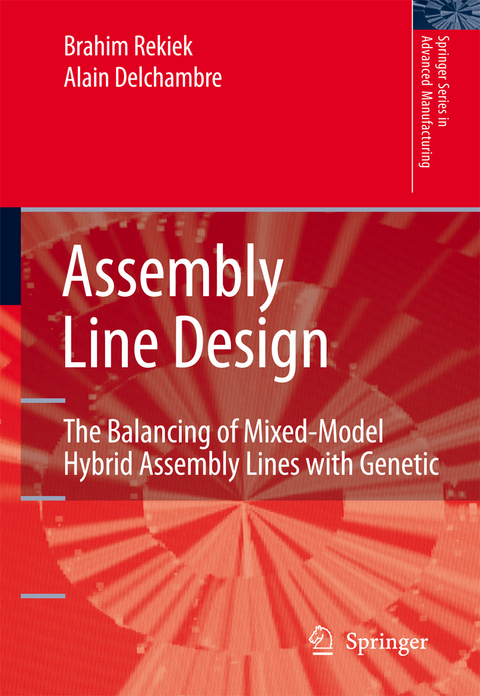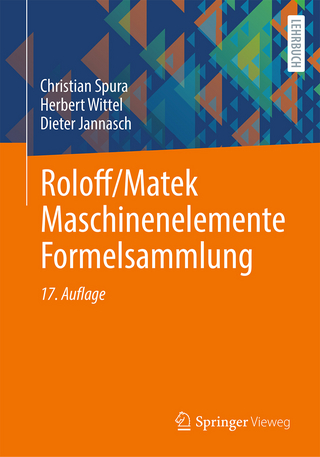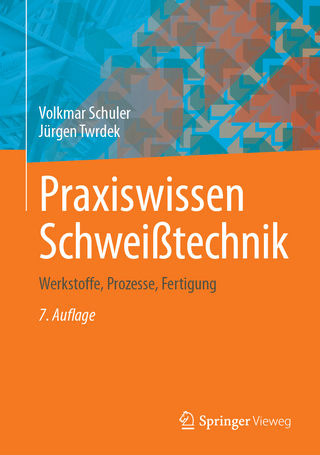
Assembly Line Design
Springer London Ltd (Verlag)
978-1-84628-112-9 (ISBN)
- ‘equal piles for assembly lines’ deals with assembly line balancing (balancing stations’ loads);
Efficient assembly line design is a problem of industrial importance. Assembly line design is often complex due to the multiple components involved: efficiency, cost and space. The aim is to integrate the design with operations issues, minimising costs.
It is important to give the designer tools to help him meet the different objectives. 3 techniques based on the Grouping Genetic Algorithm are presented which can be used to aid assembly line design:
- ‘equal piles for assembly lines’ deals with assembly line balancing (balancing stations’ loads);
- a method based on a multiple objective grouping genetic algorithm (MO-GGA) deals with resource planning (selection of equipment);
- ‘balance for operation’, deals with the changes during the operation of assembly lines.
This book will interest technical personnel in design, planning and production departments in industry as well as managers in industry. It will also be of use to researchers and postgraduates in mechanical, manufacturing or micro-engineering.
Rekiek Brahim received a license in Physics from the Univetsité Abdel Malek Essaadi, Tetouan and the D.E.S in production and robotics at the Université Libre de Bruxelles (U.L.B.), Brussels in 1994 and 1996, respectively. He received his Ph.D. degree in Artificial Intelligence in 2000 from the Université Libre de Bruxelles. Much of his work was carried out in collaboration with industrial companies. From 2001 to 2002, he worked as a member of the Sales Marketing Service at Fabricom Airports Systems, Brussels, Belgium. Since 2002, he has been working as a member of the Projects Management team. He has been an analyst and project manager responsible for the development of the baggage handling systems of many airports. His interests include software architecture, systems design, concurrent engineering, and artificial intelligence. Alain Delchambre obtained his Master and Phd degrees in Mechanical Engineering from the University of Brussels (ULB) in 1983 and 1990 respectively. After three years in industry, he joined a research centre for the Belgian Metalworking Industry (CRIF/WTCM). Since 1994, he has been a Professor at the Faculty of Applied Sciences in ULB and is head of the CADCAM department. He has published three books and more than 80 papers in the areas of concurrent engineering, computer aided design and genetic algorithms.
Assembly Line Design Problems.- Designing Assembly Lines.- Design Approaches.- Assembly Line: History and Formulation.- Evolutionary Combinatorial Optimisation.- Evolutionary Combinatorial Optimisation.- Multiple Objective Grouping Genetic Algorithm.- Assembly Line Layout.- Equal Piles for Assembly Line Balancing.- The Resource Planning for Assembly Line.- Balance for Operation.- The Integrated Method.- Evolving to Integrate Logical and Physical Layout of Assembly Lines.- Concurrent Approach to Design Assembly Lines.- A Real-world Example Optimised by the OptiLine Software.- Conclusions and Future Work.
| Erscheint lt. Verlag | 10.11.2005 |
|---|---|
| Reihe/Serie | Springer Series in Advanced Manufacturing |
| Zusatzinfo | 95 Illustrations, black and white; XVIII, 160 p. 95 illus. |
| Verlagsort | England |
| Sprache | englisch |
| Maße | 155 x 235 mm |
| Themenwelt | Technik ► Maschinenbau |
| Schlagworte | Assembly Line Design • Engineering design • Genetic Algorithm • Grouping Genetic Algorithm • Multiple Objectives |
| ISBN-10 | 1-84628-112-1 / 1846281121 |
| ISBN-13 | 978-1-84628-112-9 / 9781846281129 |
| Zustand | Neuware |
| Informationen gemäß Produktsicherheitsverordnung (GPSR) | |
| Haben Sie eine Frage zum Produkt? |
aus dem Bereich


